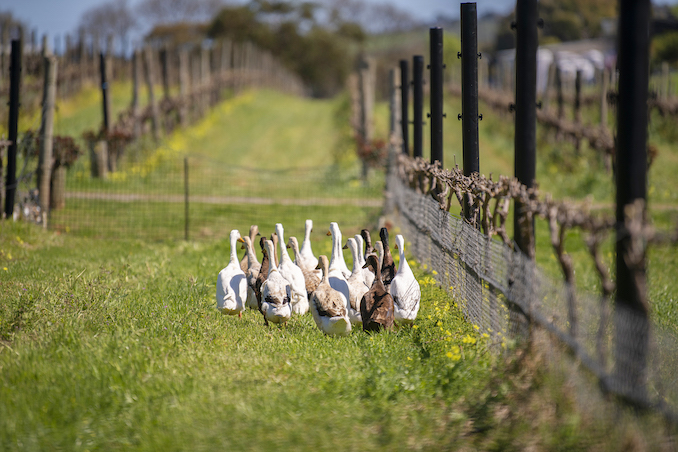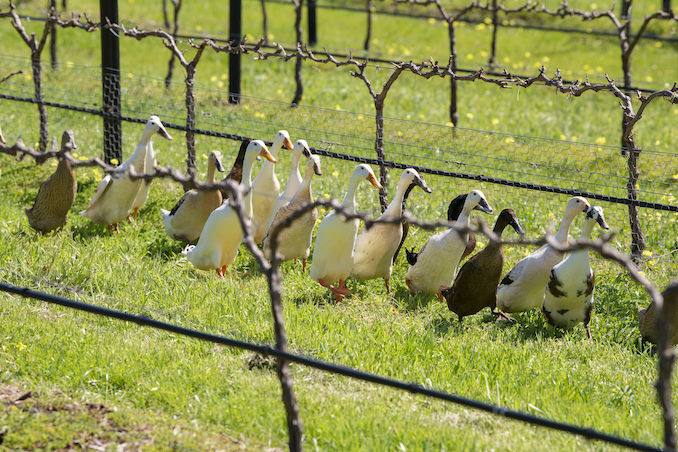When you think of the important elements needed in order to produce award-winning, organic wine, the last thing you may consider are the role ducks may play. Yet, at Angove Family Winemaker’s vineyard in the McLaren Vale, the resident ducks are considered very special staff members. Ones that are so important, that the owners of the 130-year-old, multi-generational wine company consider the Indian Runner Ducks an integral part of the family, and the winemaking process.
“Our ducks are released every day in our Warboys Vineyard at McLaren Vale,” says Richard Angove, Joint Managing Director of Angove Family Winemakers and 5th generation winemaker. “The sight of the waterfowls waddling out of their specifically designed ‘Duck Hotel’ is guaranteed to bring a smile to all visitors’ faces, but they also play a very important role in our vineyard. The ducks keep the snail population under control without the need to use pesticides on the vines.”
With the help of their feathered employees, Angove have been able to continue their commitment to sustainability at all levels and maintain their Certified Organic status.
“We are unable to use traditional chemicals to control weeds in the vineyard, so instead we need to resort to manual removal for young vines, or mechanical removal and under-vine mulching in the older more established vineyards.”
“The snails used to crawl up into the vine canopy and munch away on the young green shoots of the developing leaves and grapes,” continues Angove. The (human) team had removed more than 400kg of snails from the vineyard by hand during one growing season when they heard about other organic farms overseas using ducks to keep the pest population under control.

The ducks are encouraged to rotate their attentions through different sections of the vineyard, which helps to keep the snail population under control without the need for manual removal or pesticide use.
The success of Angove Wines and their status as one of the world’s leading “green” companies isn’t just down to the hard work of their resident ducks. Their Angove Certified Organic range is one hundred percent Certified Organic, handcrafted, and vegan friendly. The family owned company were one of the first vineyards to adopt organic winemaking, a foresighted move which has paid off. They now produce an impressive 160,000 nine-litre cases of Certified Organic wine and counting.
“To date we have converted 330 hectares of organic vineyard in the Riverland and McLaren Vale to certified organic and biodynamic,” says Victoria Angove, Joint Managing Director of Angove. “At the moment, 150 hectares are currently two years into the three-year conversion process having begun conversion mid-2017. There is an overall goal to have all 480 hectares of company owned vineyard, Certified Organic by 2020, resulting in a massive overall reduction in synthetic chemical and tractor use.”
Their commitment to sustainability doesn’t just lie with the ducks. The winery employs several ecological and sustainable practises to continue their accreditation as Certified Organic winemakers, including introducing drip irrigation, water tank installation, vine mulching and reusing winery wastewater to fuel a woodlot planted with native species.
The 400ha Nanya Vineyard is now entirely farmed under organic certification, making it one of the largest organic vineyards in the world. The company continues to flourish as well as their vineyards, turning over more than $56 million, a growth of 28% year on year. To meet the demand of the 50% increase in organic wine consumption[1] the company is reducing their range in order to focus on the quality of their output.
Made with the gentlest touch and with minimal inputs, their wines are sourced from premium grapes grown in a number of organic and biodynamic vineyards through McLaren Vale and the Riverland, their wines. “At no stage during the grape growing or winemaking processes are synthetic chemicals or non-organic processes used,” says Tony Ingle, Chief Winemaker at Angove Organic.
Next time you take a sip of an Angove Organic wine, raise a glass to the company’s beloved employees who toil so tirelessly and happily in the vineyard.
For more information go to: https://angove.com.au
[1] Australian Organic Market Report, 2019

